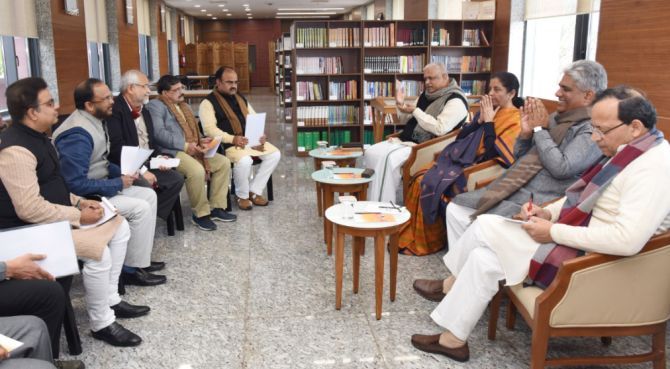 | « Back to article | Print this article |
Sources said much has been done to ease the tax burden of the middle classes in the last five years, and that such a measure affects only a limited segment of people when the focus should be to put money in rural areas.
Archis Mohan reports.

The Bharatiya Janata Party has recommended to Finance Minister Nirmala Sitharaman that the Union Budget should strive to shift the focus from macroeconomic parameters, such as reining in fiscal deficit and inflation, to “real problems” facing the economy.
The party has diagnosed that emphasis on meeting fiscal targets and controlling inflation needs to be overcome to spur growth.
It has suggested an inflation linked monetary policy.
Interestingly, none of the stakeholders the BJP consulted demanded any reduction in direct income tax, neither has the party recommended any relaxation.
Sources said not only the government currently faces resource constraint, but much has been done to ease the tax burden of the middle classes in the last five years. Also, it was argued that such a measure affects a limited segment of people when the focus should be to put money in rural areas.
The BJP has suggested that revenue constraints facing the government can be resolved through disinvestment of PSUs, monetisation of government assets and improving the primary and secondary bond markets.
The corporate sector, it has said, currently suffers from “twin risk averseness”, including with supply credit from banks, leading to deleveraging and problems in capital formation.
While this can be addressed by spurring consumer demand, the party has recommended the government should look at NBFCs, where it can remove capital formation restrictions and excessive oversight wherever public money is not involved.
Party sources said the BJP was committed to its philosophy of inclusive growth, but with a market friendly face.
For a more transparent market system, it has suggested doing away with dividend distribution tax, as also CTT (commodity transaction tax) and STT (securities transaction tax).
It has observed that not much tax revenue accrues from CTT and STT, but it hurts financial markets with increase in cost of transaction causing a shift to Singapore and Hong Kong.
“The BJP had launched a two-month long process, led by party chief JP Nadda and general secretary (organisation) BL Santhosh, to gather feedback from diverse stakeholders, including 250 organisations and dozens of experts,” the party’s economic affairs spokesperson Gopal Agarwal said.
A detailed presentation was given to the FM at the BJP headquarters in the national capital on January 9.
For increasing liquidity in the rural economy, it has recommended more budgetary allocation for schemes that have worked -- PM-KISAN, MNREGA and Ayushman.
Its feedback is that the direct transfer of MSP to farmers has helped, and should be expanded to rid the system of middlemen.
The BJP has stressed that all FTAs (free trade agreements) with the ASEAN countries should be renegotiated. It has argued that import duty on inputs should be aligned with that on custom duty on finished products.
While not a recommendation, the IT sector flagged to the party the issue of Indian companies operating in the US and Europe must have a level playing field.
From the feedback, the BJP has observed that the Insolvency and Bankruptcy Code (IBC) resolution process has become clogged after inclusion of homebuyers' interests leading to judicial delays, and real estate needs a separate process to reduce delays in the IBC resolution process.
On MSMEs, it has asked for services and industries, and micro and small industries, should be dealt separately as they face distinct issues.
Similarly, MSMEs should have a different financial resolution mechanism.
It has recommended decriminalisation of some of the provisions of Company Law.
Archis Mohan is a journalist with Business Standard. He can be contacted at money@rediff.co.in.